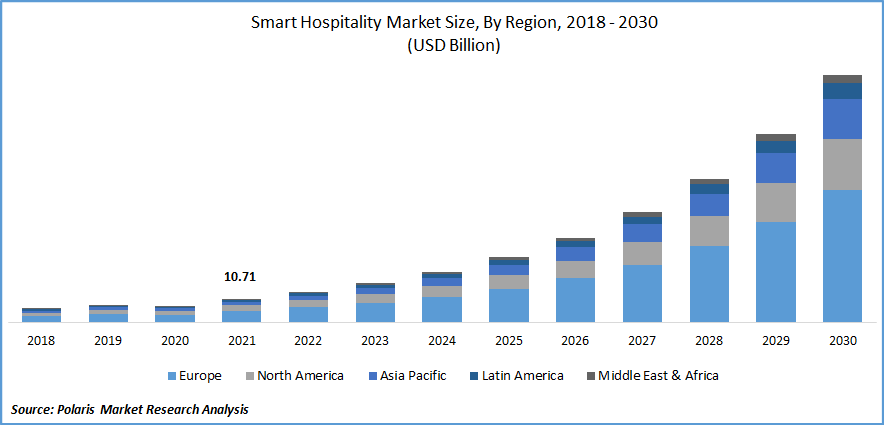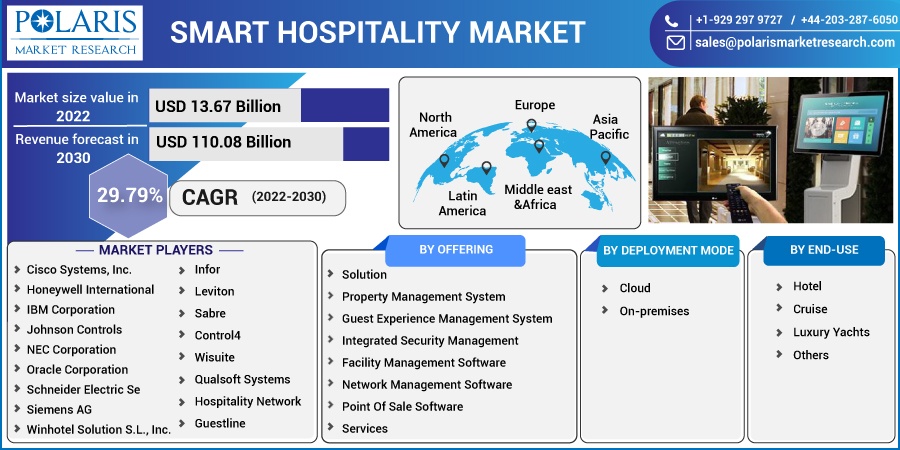
Smart Hospitality Market Share, Size, Trends, Industry Analysis Report, By Offering; By Deployment Mode (Cloud and On-premises); By End-Use (Hotels, Cruise, Luxury Yachts and Others); By Region; Segment Forecast, 2022 - 2030
- Published Date:Nov-2022
- Pages: 117
- Format: PDF
- Report ID: PM2777
- Base Year: 2021
- Historical Data: 2018-2020
Report Outlook
The global smart hospitality market was estimated at USD 10.71 billion in 2021 and is projected to grow at a CAGR of 29.79% during the forecast period.
In order to improve the guest experience and increase revenue, hotels can adopt digital in-room entertainment systems. Various hospitality brands have the flexibility to modify and customize both their back-end solutions and those that give visitors a customized experience. For example, smart hospitality provides Wi-Fi, interactive T.V., IPTV services, and H.D. channels that are free to hotel guests. It helps to improve customer satisfaction and experience.

Know more about this report: Request for sample pages
In addition, it greatly enhances hotel operations. For example, the hotel management software will keep cleaning and the front desk in sync and eliminate the need for paper forms for manual check-in. In addition, hotels now feature integrated sensors for T.V.s, lights, and voice recognition technology for addressing visitor questions. These reduce hotel costs and rates by taking a sizable amount of work off the front desk.
In some hotels, the mobile device can serve as the environmental control for the room. This allows the visitor to remotely adjust the temperature and open and close the window coverings. Therefore, "digital hospitality" is the core concept of smart hospitality.
In addition, smart hospitality means catering can give outstanding client service. The demand for hospitality software and services, as well as the increased need for real-time improved guest experience management, lower operating costs, and a growing propensity towards IoT, are the main reasons propelling the growth of the global market.
A technique called "smart hospitality" is utilized in hotels to employ connected equipment to communicate with one another. It is comparable to the internet of things (IoT), which allows even common home appliances or hotel equipment to send and receive data and make logical judgments. It improves guest safety with warning and mobilization; staff mobility, guest reservation solutions; and storage solutions.
 Know more about this report: Request for sample pages
Know more about this report: Request for sample pages
Industry Dynamics
Growth Drivers
Due to the tourism industry's explosive growth, investment in hotel developments is anticipated to increase dramatically over the next few years. This results from rising spending power, increased demand for upscale accommodations, and other things. Additionally, it is anticipated that the tourism industry will grow following COVID-19, boosting hotel demand and contactless smart hospitality solutions. This is then expected to affect the expansion of the global market positively.
Cruises, wellness, sports, MICE, eco-tourism, film, and religious tourism are unique travel options it offers. In addition, both domestic and foreign tourists know India as a spiritual destination. Under the Swadesh Darshan Scheme, the Ministry of Tourism approved 76 projects in August 2022, totaling Rs. 5,399.15 crores ($678.39 million), to improve the nation's tourism infrastructure.
The travel and tourism sector contributed $121.9 billion to GDP in 2020; by 2028, it is anticipated to have increased to $51 billion. Between 2019 and 2028 in India, the sector is projected to grow at an average yearly growth rate of 10.35%. Such government initiatives will drive global market growth.
Report Segmentation
The market is primarily segmented based on offering, deployment mode, end-use, and region.
|
By Offering |
By Deployment mode |
By End-Use |
By Region |
|
|
|
|
Know more about this report: Request for sample pages
The Guest Experience Management type segment is expected to witness the fastest growth.
In 2021, the Guest Experience Management type sub-part was anticipated to expand rapidly throughout the projected period in the global market. The growing need to streamline customer service operations and establish a powerful brand will be what propels the adoption of digital hospitality solutions. Additionally, improving the guest experience is the hotels' and other hospitality facilities' primary goal.
Cloud Segment accounted for the second-largest market share in 2021
Cloud Segment is projected to dominate the industry in the upcoming years. In 2021, the Software-as-a-Service (SaaS) and Platform-as-a-Service (PaaS) were two cloud deployments used in the hotel industry. This method lowers the cost of infrastructure by allowing hotels to install their software and services in a virtual ecosystem. The price of buying, maintaining, and powering server-class equipment decreases with the cloud-based deployment of smart hospitality software. Hotels benefit from enhanced scalability and lower ownership costs with this subscription model.
Additionally, it lessens the chance of security breaches while ensuring the reliability of data backup. The company that provides cloud solutions is responsible for managing the back-end operations. As a result of all of the benefits provided by the cloud deployment option, there is a likelihood that demand for these solutions will increase over the upcoming years. This is because cloud-based solutions are required for the sensors and other devices that smart hospitality solutions increasingly utilize.
The Hotel segment is expected to witness the fastest growth
In 2021, the hotel segment will hold the largest market share. The requirement for hotels to provide intelligent hospitality services and solutions is fueling the segment's rise. Additionally, the market will be driven by the rising standard of living, the abundance of five-star accommodations, and a marked improvement in customer service.
As per the hotelier magazine, investors concentrated on purchasing luxury or resort properties with high domestic or leisure demand across all areas. In 2022, this trend is anticipated to pick up even more speed, with estimates placing the worldwide transaction volume up between 35% and 40% from 2021 levels. Additionally, the industry's increased dedication to environmentally friendly operations and procedures presents opportunities for investment groups worldwide, raising asset prices.
The demand in Asia-Pacific is expected to witness significant growth
The global market is expected to dominate Asia-Pacific during the forecast period. However, A favorable government policy to expand the hospitality sector will likely boost the global market's growth in the projected years. In addition, the region's hospitality sector is increasing because of technological advancements, internet infrastructure, Internet of Things applications, and efficient energy use. Furthermore, the market in the region will be driven by a booming tourism sector, a more modern hotel infrastructure, and a high rate of new hotel openings in numerous Asia-Pacific nations like Thailand, Malaysia, and Indonesia.
According to Hotelier India, the Indian hospitality sector is anticipated to grow between 2019 and 2028 at a rate of 10.35%. By 2027, it is expected that the Indian travel market will be worth $125 million. The global market's highest revenue share in 2021 came from Europe. An essential domestic cloud provider, an openness to new technologies, and a reasonably robust internet infrastructure have all contributed to the expansion of the industry. As a result, there is a growing market for Internet of Things (IoT) products in Europe.
Competitive Insight
There are numerous significant players in the global market, such as Cisco Systems, Honeywell International, IBM Corp, Johnson Controls, NEC Corporation, Oracle Corporation, Schneider Electric, Siemens, Winhotel Solution, Huawei Technologies, Oracle, Johnson Controls, Samsung, Leviton, Sabre, Springer-Miller Systems, Control4, Qualsoft Systems, Hospitality Network, Guestline, Cloudbeds, Frontdesk Anywhere, Chris Lewis, Xie Zhu, BuildingIQ, Stayntouch, and others.
Recent Developments
In May 2022, Sigma and El Attal Holding each signed a memorandum of understanding with Siemens. By implementing a BMS control system for commercial and residential buildings and the SCADA system, the companies sought to create an electronic platform to reduce energy consumption, handle operating mistakes, and anticipate breakdowns after forming this cooperation.
In July 2021, Honeywell partnered with Signify, to enhance the customer experience by increasing productivity and well-being through connected lighting solutions for smart buildings in order to reduce energy consumption.
Smart Hospitality Software Market Report Scope
|
Report Attributes |
Details |
|
Market size value in 2022 |
USD 13.67 billion |
|
Revenue forecast in 2030 |
USD 110.08 billion |
|
CAGR |
29.79% from 2022 – 2030 |
|
Base year |
2021 |
|
Historical data |
2018 – 2020 |
|
Forecast period |
2022 – 2030 |
|
Quantitative units |
Revenue in USD billion and CAGR from 2022 to 2030 |
|
Segments Covered |
By Offering, By Deployment Mode, By End-Use, and By Region |
|
Regional scope |
North America, Europe, Asia Pacific, Latin America; Middle East & Africa |
|
Key Companies |
Cisco Systems, Inc., Honeywell International, IBM Corporation, Johnson Controls, NEC Corporation, Oracle Corporation, Schneider Electric Se, Siemens AG, Winhotel Solution S.L., Inc., Huawei Technologies, Oracle, Johnson Controls, Samsung, Infor, Leviton, Sabre, Springer-Miller Systems, Control4, Global Business Solutions, Wisuite, Qualsoft Systems, Hospitality Network, Guestline, Cloudbeds, Frontdesk Anywhere, Chris Lewis Group, Xie Zhu (China), BuildingIQ, Stayntouch, and others. |

